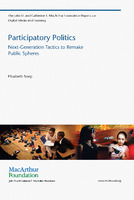Participatory Politics
Next-Generation Tactics to Remake Public Spheres
| dc.contributor.author | Soep, Elisabeth | |
| dc.date.accessioned | 2019-01-21 12:07:55 | |
| dc.date.accessioned | 2020-04-01T10:58:22Z | |
| dc.date.available | 2020-04-01T10:58:22Z | |
| dc.date.issued | 2014 | |
| dc.identifier | 1004029 | |
| dc.identifier | OCN: 1100536162 | en_US |
| dc.identifier.uri | http://library.oapen.org/handle/20.500.12657/26056 | |
| dc.description.abstract | An examination of the mix of face-to-face and digital methods that young people use in their experiments with civic engagement. Although they may disavow politics as such, civic-minded young people use every means and media at their disposal to carry out the basic tasks of citizenship. Through a mix of face-to-face and digital methods, they deliberate on important issues and debate with peers and powerbrokers, redefining some key dynamics that govern civic life in the process. In Participatory Politics, Elisabeth Soep examines the specific tactics used by young people as they experiment with civic engagement.Drawing on her scholarly research and on her work as a media producer and educator, Soep identifies five tactics that are part of effective, equitable participatory politics among young people: Pivot Your Public (mobilizing civic capacity within popular culture engagements); Create Content Worlds (using inventive and interactive storytelling that sparks sharing); Forage for Information in public data archives; Code Up (using computational thinking to design tools, platforms, and spaces for public good); and Hide and Seek (protecting privacy and information sources). After describing these tactics as they manifest themselves in a range of youth-driven activities—from the runaway spread of the video Kony 2012 to community hackathons—Soep discusses concrete ideas for cultivating the new literacies that will enable young people to participate in public life. She goes on to consider some risks associated with these participatory tactics, including simplification and sensationalism, and ways to avoid them, and concludes with implications for future research and practice. | |
| dc.language | English | |
| dc.subject.classification | thema EDItEUR::J Society and Social Sciences::JN Education::JNA Philosophy and theory of education | en_US |
| dc.subject.classification | thema EDItEUR::P Mathematics and Science::PD Science: general issues::PDR Impact of science and technology on society | en_US |
| dc.subject.other | politcs | |
| dc.title | Participatory Politics | |
| dc.title.alternative | Next-Generation Tactics to Remake Public Spheres | |
| dc.type | book | |
| oapen.relation.isPublishedBy | f49dea23-efb1-407d-8ac0-6ed2b5cb4b74 | |
| oapen.relation.isbn | 9780262525770 | |
| oapen.pages | 96 | |
| oapen.place.publication | Cambridge | |
| oapen.remark.public | 21-7-2020 - No DOI registered in CrossRef for ISBN 9780262320214 | |
| oapen.identifier.ocn | 1100536162 |

